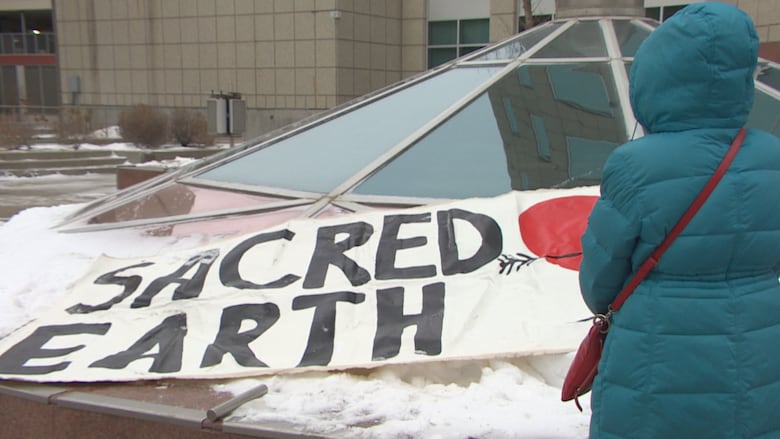Idle No More movement was 'a huge awakening,' supporter says at Winnipeg rally to celebrate 5 years
Winnipeggers gathered at Portage and Main to celebrate the social movement

Dozens of Winnipeggers braved the cold on Saturday to drum, sing and gather in recognition of the fifth anniversary of the Idle No More social movement.
"It was a huge awakening for a lot of people and, you know, it really sparked a lot of grassroots organizers, leaders — those that are … challenging oppression and pushing for justice in all kinds of systems of oppression," said Sadie-Phoenix Lavoie, who has been involved in the movement for years.
Lavoie, who is also a part of the Canadian Council for International Co-operation, said the congregation at the corner of Portage Avenue and Main Street was intended to celebrate the movement and Indigenous peoples' resilience and resurgence.
"It's going to last for as long as we're here, and we're going to be here forever," she said. "We're always going to be pushing for justice for our peoples, and you know, young people — they have the vision for that."

Since Idle No More was born in 2012, it has spread throughout North America and internationally, Lavoie said. The grassroots movement has focused on raising awareness of the rights of, and empowering, Indigenous people, but Lavoie said there's still work to do.
She pointed to a wide range of issues including environmental and natural resource rights for Indigenous people, as well as Indigenous children in care and the national inquiry into missing and murdered Indigenous women and girls.
"All these kinds of [issues] are lumped together in one big push, where you really need to work with us on a human basis, and that's nation-to-nation and that's respectful of this traditional territory," she said.

'A wind of reconciliation'
Serena Hickes hasn't been involved in the movement as long as Lavoie has. She said she got involved after being inspired by young, empowered Indigenous people.
"It's making us really rethink things and how we're approaching things. Because we need our youth to stand forward, but they also need to know that we're here and we're holding them strong," she said. "And we'll go forward, they can forward, we can stand side by side."

Esther Epp-Tiessen said she and her husband, Dan Epp-Tiessen, said they were at the event because they want to be part of the reconciliation called for by the Truth and Reconciliation Commission, and movements like Idle No More.
"I think there's a movement, there's a wind of reconciliation, and [I] hope that continues, hope it grows," she said.
Dan Epp-Tiessen said they've become increasingly aware of injustices to Indigenous people in Canada and want to support equality and justice for everyone in Canada.
"As settlers who've benefited so much from the taking of the land and so forth, we want to be here to support a different way forward, to show up at Indigenous-led events to support the move towards greater justice in this country."